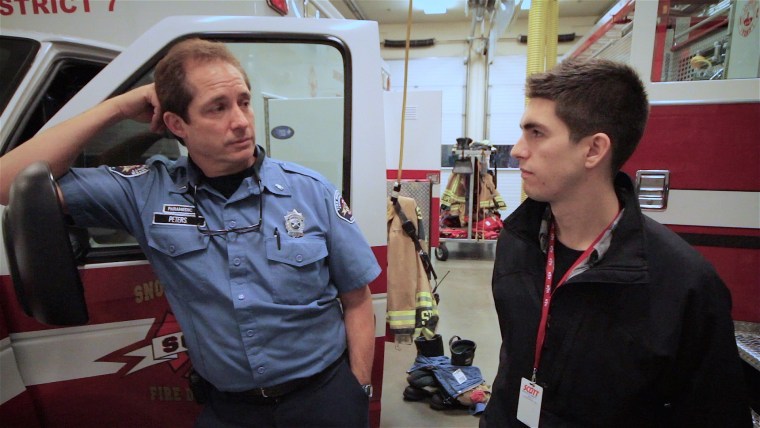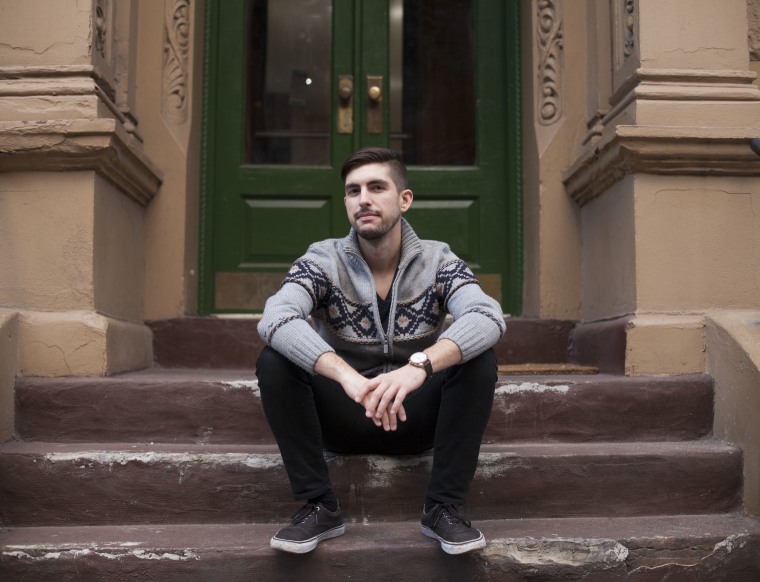The first time Alden Peters had a public screening of his new feature length documentary, “Coming Out,” may have been the most nervous the Brooklyn filmmaker has been in his entire life.
“I honestly thought I had made a huge mistake,” Peters told NBC OUT. “I’m very private. I’m very shy, and I get really embarrassed super easily.”
To some, this may seem surprising, since “Coming Out” documents Peters’ entire coming out process over a span of many years -- from early childhood to his coming out to his family and friends while a student at New York University.

“Everything happens on camera,” Peters said. “I filmed when I came out to my family and friends, and I have a bunch of footage of myself as a child. You kind of see it all and go on a journey without anybody talking in hindsight.”
Peters has since grown a bit more comfortable with seeing his face on the big screen, and over the past year he has seen that face quite a bit.
After spending the past 13 months being shown at film festivals across the world, “Coming Out” enjoyed its official release on DVD and iTunes last week, just in time for National Coming Out Day on October 11.
“It’s interesting, because I’ve been working on this for five-and-a-half years, so for me it’s an old project,” Peters said. “[But] for most people, this is going to be the first they have heard or seen anything of this film.”
Peters started working on the project in June 2011 and wanted to create a film that in his opinion didn’t yet exist. He had spent a lot of time watching coming out stories online to help with his own coming out process, but he was never able to find any videos of the build-up to these moments or the immediate aftermath.
“I started looking for the next deeper step, and I wanted to see that on camera ideally,” Peters said. “I wanted to see the whole process, more than just that moment of telling somebody.” So Peters decided to make for himself the film that he wanted to see.
The result is a fresh take on a story that in many ways may feel familiar to those who have already gone through the process of coming out. And for those who haven’t, the story can offer an intimate portrayal of one individual’s journey through the experience.
One scene that may be particularly relatable is when Peters comes out to his father on a trip home to Washington state. “I think that gay men especially have this ‘coming out to your father’ hesitation that’s very specific to us,” Peters said. “And I think part of it is this idea of masculinity. And you saw with my dad, that was somebody I was extremely nervous to tell.”
In another scene, Peters agonizes over how to best come out over Facebook, highlighting one of the required rituals of coming out in the age of social media.
In fact, social media is a common thread throughout the film, and much of Peters’ own inspiration for the film came from his time spent watching the many coming out videos that exist online.
Amit Routh works as the senior manager of peer support programs at The Trevor Project, a national organization devoted to providing crisis intervention and suicide prevention services to LGBTQ youth. The primary focus of Routh's work is TrevorSpace, an online social network.
“Social media has been both a boon and a burden for LGBTQ youth,” Routh told NBC OUT. “It's definitely wonderful that young people can find community with other young people going through similar issues on such a global scale, but on the other side, social media also can enable bullying and harassment that otherwise would have stopped after school ended.”
Routh believes the most important thing for young people to remember when deciding whether to come out is that there is no single best way or time to do it. “It is an incredibly personal process that is going to be different for everyone, because everyone is living with such varied circumstances.”
Social media has definitely changed the way many young people approach the decision, and many are deciding to tackle the process in a very public way.
One of the most viewed coming out videos of all time on YouTube can be found on the channel the Rhodes Bros, which belongs to twin brothers Aaron and Austin Rhodes. Their video, in which they both come out to their father over the telephone, has been viewed on YouTube over 23 million times.
“The outpouring of love and acceptance from people was absolutely incredible after we posted the video,” Aaron Rhodes told NBC OUT. Rhodes said he and his brother had decided to come out publicly on YouTube, because they wanted to show people that coming out is still a difficult step for many to take.
“Living somewhere like [Los Angeles] you can begin to feel numb to [the importance of coming out], because it's quite accepted here,” Rhodes said. “There was definitely anxiety as we pushed that publish button not knowing how people would react to us sharing such an intimate moment, but the power of our dad’s reaction and words were so amazing that we needed to share it.”
Rhodes said social media definitely helped with the process but echoed the idea that social media brings with it a unique set of challenges. “I think sometimes we can get caught up in comparing ourselves to others, and social media really magnifies that,” Rhodes said. “You have to always remind yourself that you are uniquely beautiful.”
It’s this emphasis on an individual’s unique personal story that Peters hopes to bring with his film, “Coming Out,” and he hopes his story can be just one of the many that can serve as a resource to those still struggling with becoming more open with who they are.
“Everybody’s coming out story is nuanced and unique and tailored to them and their relationships,” the young filmmaker said. “You watch this film, and you saw my coming out, [but] this is not a film of what coming out should be. This just happens to be one story told in depth. It’s a positive representation that’s part of the much larger collection of coming out stories and ways to think about the coming out process.”
